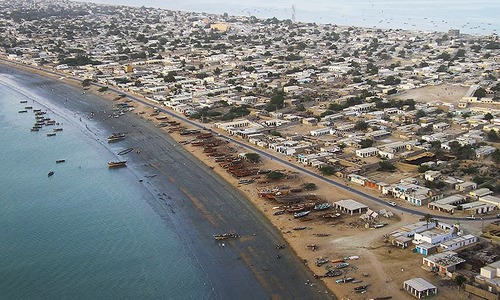ISLAMABAD: A Senate special committee on the China-Pakistan Economic Corridor (CPEC) has prepared its third report on the project raising questions over the fate of the Gwadar port.
The committee, which met at the Parliament House on Wednesday, termed the port project a “non-starter” and claimed that the corridor’s 1,674km western route covering the areas of Burhan/Hakla, D.I. Khan, Zhob, Quetta, Sohrab, Bisma, Panjgur, Turbat and Gwadar was the least priority of the government.
Talking to Dawn, the special committee’s chairman Senator Taj Haider said that more recommendations were made at the meeting which would be incorporated in the final report and after that it would be presented before the Senate.
He said the government was utilising its resources for upgrade of the existing port of Karachi instead of developing the partly constructed Gwadar port. “The government’s claim regarding completion of the Gwadar port is mere eyewash,” he said.
“Four deep sea berths that are 16 metres deep at low tide have already been built at the Karachi port. Another six are in advanced stages of construction. With the completion of a six-lane motorway on the eastern route, all traffic from China and inland Pakistan will naturally flow on the eastern route and will use the deep sea berths of the Karachi port.
Senate body prepares third report on CPEC
“The agreed western route with its narrow two-lane road and the Gwadar port where construction of deep sea berths is presently only on pre-feasibility stage remains a non-starter,” the report said.
The Senate committee noted that there were many indications on ground which suggested that the agreed western route was not being given priority as per promise publicly made by Prime Minister Nawaz Sharif on Jan 15 this year, while work on the eastern route and Peshawar-Karachi Main Line 1 of railways was progressing on a fast pace and construction of a six-lane motorway on the eastern route was expected to be completed at a very early date.
“The special committee expressed serious concern that up till now a shroud of secrecy hangs around major decisions taken by the Joint Coordination Committee (JCC) of China and Pakistan. There are reports that the JCC has excluded the agreed western route from its programme. The ground facts brought before the special committee further strengthen this apprehension. The committee has directed the Ministry of Planning and Development to share with it the MoU of JCC and the minutes of the JCC meetings,” the report said.
The committee’s chairman said the western route was not being constructed beyond D.I. Khan (Khyber Pakhtunkhwa) and Balochistan. “An amount of Rs124 billion announced for the Burhan-D.I. Khan section is being spent in Punjab as the section is situated in the province. Notwithstanding the fact that this section confirms to the CPEC concept and philosophy of choosing the shortest alignment, this section completely bypasses Khyber Pakhtunkhwa,” he added.
The committee also took notice of the physical obstruction in the shape of mountain between D.I. Khan and Zhob and regretted that the problem of constructing a motorway that ran across this obstacle had not been accorded serious consideration by the National Highways Authority. “What can be the engineering solutions? Does an alternative exist? How long will it take to materialise the most feasible engineering solution?” the committee asked.
The committee was of the opinion that the entire CPEC route could not be held hostage to one single obstacle on agreed alignment and directed the NHA to submit a clear-cut plan to build a motorway through this obstacle at the earliest.
The committee praised the railways ministry for executing railway projects which did not fall under CPEC. “The special committee wishes to record its deep appreciation of the fact that the Ministry of Railways on its own initiative has undertaken to build a railway line that will connect Peshawar with Gwadar.
From D.I. Khan to Gwadar this planned railway line shall follow the alignment of the agreed western corridor.
The Ministry of Railways plans to upgrade the abandoned pre-independence railway tracks to the required technical standards and to lay new tracks on the sections where these have not existed earlier,” the report said.
The committee regretted that no new power plants had been planned along the agreed western route. “There is the Suki Kinari hydropower project of 870MW on the one end and then almost after 1,700km there is the thermal 300MW Gwadar power plant. Power plants of high generation capacity are included in CPEC, but these are situated at places far away from the agreed western route,” the report said.
Published in Dawn September 29th, 2016













































